Home » Jazz Articles » Interview » Jamie Krents: Hardcore Jazz Fan And New President Of Impulse!
Jamie Krents: Hardcore Jazz Fan And New President Of Impulse!

I'm a white guy from Washington DC, I could never make a statement with the same profundity and perspective that some artists of color have done. But we can provide a platform. It's not anything we deserve a pat on the back for. It’s our basic obligation. It's fundamental to what we do. You sign these artists and you let them make their statements.
—Jamie Krents
In his first interview since taking up his new position in August 2022, Krents makes plain that he absolutely subscribes to the values that made Impulse! the cultural powerhouse it was under Creed Taylor, Bob Thiele and Ed Michel in the 1960s and early 1970s. Building on those values, says Krents, is key to his strategy going forward.
Easy to talk to—the Q&A which follows is virtually unedited apart from the deletion of a few ums and ers on the part of AAJ—Krents comes across not like your stereotypical record company boss but as a fan with genuine commitment to what Impulse! stands for. Indeed, it feels safe to stick one's neck out and say that, after a long time in the wilderness, the label is in great hands again.
Krents has also been appointed president of Impulse! sister label Verve. But that is another interview. This one is about Impulse!.
First, briefly, the backstory...
Up 'Gainst The Wall
The last of the great first-generation producers/artistic directors, Ed Michel, left Impulse! in 1975 following a regime change. Other changes of ownership followed and, increasingly, the label became a footnote in the corporate scheme of things. In the 1980s, releases slowed to a trickle. They picked up a little in the 1990s and there were a few memorable albums, such as Horace Silver's Hard bop Grandpop (1996). But others, while decent enough, did not sit comfortably in the lineage. For instance, Diana Krall's Love Scenes (1997) bore Impulse! branding. An excellent disc in its own right, it helped keep the lights on, but was it really Impulse!? It is doubtful that Krall thought so either. Then things got even worse: in terms of new music the 2000s were a hole in the air, inhabited only by McCoy Tyner Plays John Coltrane (2001, recorded 1997) and Alice Coltrane's marvellous Translinear Light (2004).By the mid 2010s it looked like Impulse! was destined to be a legacy brand, albeit a great one. And then, without warning, the label got back on the good foot...
The Awakening
In 2018, not long before Jamie Krents's formal promotion to executive vice president, Shabaka Hutchings's Sons Of Kemet released Your Queen Is A Reptile on Impulse!. The disc was followed by albums from two other Hutchings bands, masterpieces or near-masterpieces all of them: The Comet Is Coming's Trust In The Lifeforce Of The Deep Mystery in 2019 and Shabaka And The Ancestors's We Are Sent Here By History in 2020. Sons Of Kemet followed up with Black To The Future in 2021 and The Comet Is Coming with Hyper-Dimensional Expansion Beam in 2022 (check the YouTube below for a taste of that cosmic jazz-rock stonker). With these discs alone, Impulse! signalled that it was back on track (and that signing Hutchings was the best thing to happen to the label in years).There have been other terrific releases, too: from harpist Brandee Younger (Somewhere Different, 2021), and from drummer Ted Poor (You Already Know, 2020) and bassist Pino Palladino (Notes With Attachments, 2021), two Blake Mills-produced records that are as daring in their own way as those from Hutchings's bands. There have also been three releases of previously unissued John Coltrane recordings: Both Directions At Once: The Lost Album (2018), Blue World (2019) and A Love Supreme: Live In Seattle (2021).
From a standing start, in just over three years (which included the peak of the pandemic) Impulse! released as many newly recorded albums as it did in the entire 1980s. And it is not just the quantity of releases that is noteworthy. More importantly, it is the nature of the music. First generation Impulse!'s spiritual home was New York City's pre-gentrification Lower East Side. Since 2018 its spiritual home, or anyway the one inhabited by Hutchings and his associates, is an alignment of East London DIY performance spaces, SXSW and Worldwide FM, with South Africa thrown in for good measure. The jazz axis has tilted and, with Krents at the helm, the label is leaning into it. Once again, the new wave of jazz is on Impulse!.
In the interview below, Krents—born in Washington DC and now resident in Brooklyn, where he lives with his wife and their eleven-year old son—talks to All About Jazz about Impulse's historic and continuing role as a facilitator of musical and broader cultural change, the responsibility he feels he has inherited from Bob Thiele and his generation, his approach to new artist signings and the curation of the label's archive. Concluding the interview, he talks about seven of his all-time favourite Impulse! legacy albums (seven being the number imposed on him by AAJ).
The Interview
All About Jazz: Can you remember the first jazz record that made a big impression on you and the circumstances in which you heard it?Jamie Krents: I can. This is going to sound contrived, because it's an Impulse! record. I was in tenth grade, so I guess I was around fifteen. It was John Coltrane's Africa / Brass [1961]. I had heard jazz before but this was the first one that really grabbed me. It was like hearing music in 3D. I was turned on to it by a friend of mine, a great musician, Stewart Lupton, who was later in Jonathan Fire*Eater, one of DreamWorks's first signings. We were very lucky, growing up in DC during the golden age of punk rock. There are a lot of parallels between the punk rock world and the world of bold, free jazz. All of those guys, from Henry Rollins and Black Flag on, they're all Impulse! enthusiasts. But anyway, my friend Stewart hipped me to Africa / Brass and it was life changing.
AAJ: I read somewhere that your first job was at Universal and you've been there without a break ever since.
JK: My first real job, yes. I played bass in bands but my only salaried job has been working at this company. To clarify, it was actually at Verve. I couldn't believe it, that I was going to walk in and have access to the library and all those orange and black spines [laughs]. It was in 1998, so it was twenty million years ago. I started out as what we call a temp in the States, which means you're there on a kind of week by week contract. I thought I'd be there for a month because I was just in between tours with my band. But here we are in 2022. It's so bizarre.
AAJ: How does it feel to be president of Impulse!, this label that has been so crucial in the development of jazz?
JK: It's like a dream. It vacillates between being like a dream and kind of terrifying. Because the bar is so high and you don't want to be the person who had the label decline on their watch. But it is a dream gig and I actually feel a lot of focus and clarity about what Impulse! can be now. Also, having worked in the music business for around twenty-five years, I think this is the best time for jazz since I've been in it. The last five years have been just such a, I won't say renaissance, but the conditions are so good now for interesting, elite jazz musicians. Jazz has known tough times, there have been lots of peaks and valleys. Today is the best eco system for jazz that I've seen, so I feel very lucky that it's coinciding with me having this role.
AAJ: What do you think caused this upturn in the jazz eco system?
JK: I think it's because we live more than ever in a genreless world. Because people now are streaming music, they're not confining themselves to the left corner or the right corner of the record shop like they once did. I remember going into record shops and making that hard left, like I'm not going into the classical section or you won't catch me dead in the pop section, I'm going to go straight to the Ornette Coleman records. I don't think those boundaries are as strong now. I have a child who is eleven, and I see it with him, where he'll be listening to the Descendents and Iron Maiden and then he'll be listening to some hip hop. His generation just isn't as hung up on genres as we used to be. That's been good for jazz. I see it reflected in the way labels are signing and also the festivals, where you have guys like Shabaka Hutchings and Kamasi Washington playing at Bonnaroo or Coachella or Glastonbury. There's a great legacy for that. I mean, Bill Graham used to do that at the Fillmores and Winterland in the 1960s and 1970s. Like he'd have Miles Davis playing opposite the Allman Brothers.
AAJ: Or Charles Lloyd bending heads with "Forest Flower."
JK: We're back to that, where people are able to be more open minded. I think that's why we're in a space that's more amenable especially to jazz artists that play with a lot of energy and originality. It's not necessarily any different for super traditional artists. But it's really a world of difference for the kinds of artists who might feel at home on a label like Impulse!. Obviously I'm biased towards Shabaka because he's with Impulse!, but that kind of East London scene where he came up playing in loft parties, again, I think what an awesome echo that is of a lot of the ways that jazz initially came into focus.
AAJ: Do you have a mission statement for Impulse!?
JK: We do but it's not very articulate. I don't mind telling you that we feel very conscious of the legacy of the label, but I think it would be a disservice to just repeat what has been done and say "OK, this is our Coltrane and this is our Mingus" and just operate like that. In fact, what we're trying to do is celebrate the spirit of the label, which is really great, largely instrumental jazz or music that kind of has no precedent. Our mission is not to tarnish the legacy, so that when you see that orange and black and the logo you know you're going to get music from an artist who really has their own point of view. It's not very difficult when we find an artist we like to decide whether they're right for Impulse! or Verve. It's not hard to figure out whether something captures that spirit that Creed Taylor and Bob Thiele used as their North Star. Anyway, I feel like we know what we need to do and now we need to do it.
AAJ: The release of Both Directions At Once, Blue World and A Love Supreme Live In Seattle were unexpected treats. Do you have any more surprises like that up your sleeve?
JK: We do. We have some more John Coltrane stuff coming up, but it would be premature for me to go into the details now. And in 2023 we also have some more stuff coming from Alice Coltrane. That's probably the only one I can allude to now. Sorry to be vague. But yes, releases of previously unavailable, quality music have become a central part of what we do. It's really just a matter of sorting through what things should be out there, which the artists would be proud of, and what should remain in the vault because they're not meant to be out there.
AAJ: Like those "rarely performed operas" that are rarely performed for a good reason.
JK: We have a guy at Impulse! and Verve called Ken Druker, who is one of the great jazz archaeologists slash arbiters of taste. There are so many recordings, mastertapes, you know, things found under somebody's grandmother's bed, that you have a lot of opportunity now to release unreleased music, whether it's live stuff or studio recordings. But sometimes things have remained unreleased for a reason. We have to be stewards of the music but we also have to be a filter and try to work with the estates of these artists if they are no longer with us, to make sure it's something the artists would have wanted out there. I know people might think, "Oh, Impulse! is part of Universal, they must do everything they can to make money," but there are things that we opt not to release or we will block other parties from releasing if we don't think they measure up to the artist's standards.
AAJ: I sometimes reflect on the fact that in the 1960s and 1970s Impulse! was a label run by white businessmen which gave a platform to some of the era's most politically as well as artistically radical African American jazz musicians, and some white ones, too. It was a time of great change and upheaval. In 2022 we're living in interesting times again, and this makes Impulse! hugely needed once more. Do you have any observations on that?
JK: I do. First of all I am proud of that aspect of the label, both in its catalogue and in the records we're doing now. I can tell you that during the aftermath of the George Floyd verdict here in the US, we were very active: Universal has a task force for meaningful change as a company. And we were doing other stuff like making playlists from albums such as Charlie Haden's Liberation Music Orchestra or Archie Shepp's Attica Blues. There are so many statements from the Impulse! discography which are still relevant. Look, I'm a white guy from Washington DC, I could never make a statement with the same authenticity, profundity and perspective that some artists of color have done. It's more like we can let the music do the talking. We can provide a platform. We can elevate it and we can amplify it. Certainly Shabaka has strong opinions, with all of his groups. And Brandee Younger. She is passionate and has strong opinions about world events and her experiences as a person of color.
So I think on our best day what we are is a platform for those artists. And that is not any of my doing. It is absolutely the tradition and responsibility I've inherited from Bob Thiele and that generation. I mean, it's not courageous for someone like me at this point to try and help artists make those statements. It was a lot harder for Creed and Bob, dealing with the ABC-Paramount corporate executives in the 1960s. It took more courage back then than it does now. Universal is a company that is extremely dedicated to these messages and trying to improve equality. To be clear: it's not anything we deserve a pat on the back for. It's our basic obligation. It has always been fundamental to Impulse!. You sign this kind of artist and you let them make their statements. That's what was so brilliant about Bob, and Creed for the short time he was at Impulse!. Bob really let artists make their records. They did not censor their artists.
AAJ: Creed Taylor memorably said that you don't produce an artist like John Coltrane, you just make sure the tape is running.
JK: Right. Many people at record labels have a tradition of putting executive producer credits on albums. That would never occur to me. I think most of the artists we sign to Impulse! don't need a producer. If they use one it's because they want one. I think Creed had it right. You sign a genius and stay out of the way. Our role is on the amplification side, once the music is there.
AAJ: You mentioned Shabaka. In the first phase of Impulse! it was people of colour from America who defined the label. Shabaka was born in London but from a young age was raised in his parents' native Barbados, which only gained sovereignty from Britain in 1966. So he brings another twist to the perspective.
JK: One that comes with a different accent. And also he's been spending a lot of time in South Africa. Colonialism takes on many shapes and forms. Shabaka has great insight. As you said, part of it is his heritage, and part of it is his natural wanderlust and curiosity. He has a lot to say about it, from the titles of the Sons Of Kemet albums to the music itself, to his playing of the flute and more meditative moments. All these thing are going on. Signing Shabaka was probably the greatest thing that happened to Impulse! in the last couple of years. We haven't signed a ton of artists to Impulse!. We're, I don't want to sound arrogant and say we're picky, but we're selective because part of issue is just trying to find the artists who are aligned with those principles you have identified. Shabaka was such a no-brainer, because he touches on all those things, musically, socially, intellectually, on all fronts. And I would say the same thing about Brandee. Then there's Pino Palladino. I mean, he's a white Welshman but he's got a lot to say as well. And Ted Poor. He's an absolute scholar of people like Elvin Jones and Roy Haynes. He's a drummer and percussionist who's an absolutely brilliant leader and composer. We're just trying to find artists that feel like an organic good fit.
AAJ: I love the Ted Poor album. Will he be doing another?
JK: I hope so. He's just been so busy. Ted is a professor of music in Washington University in Seattle and he's also been on the road with a rock artist called Andrew Bird. So I don't think he's had a minute to think about it. But the guy is peerless. I'm glad you like the record. I think it's one people will continue to discover. There's a lot in that album.
AAJ: Have you got any new artists in the pipeline?
JK: There is one right now. I'm probably just weeks away from being able to talk about it. I'm really excited about it but because the contract is not quite signed yet, I can't. Again, sorry. We're don't sign a million artists for the reasons I've mentioned, and we also want to focus on the records properly. They do require real marketing and you really have to lean into them because they're generally left of center records. Also, things were particularly challenging during the pandemic because I like to see artists playing live before I sign them. I think it's so important to know that these artists are just as great live as they are in the studio. For the better part of two years that wasn't possible. But I feel we're now in a more ripe signing period for Impulse!. I'm not saying the pandemic is over but we're all sort of navigating it now. I'm optimistic that our signings will accelerate.
Jamie Krents's Top Seven Impulse! Heritage Albums
Picking just seven albums out of the treasure trove that is Impulse! is a tough task. But sometimes a shorter list reveals more about the taste of the selecter than a longer list. We made the exercise a little easier by asking Krents to narrow the field to the label's first-generation legacy titles and avoid living artists (sorry Sonny Rollins and Roy Haynes). Anyway, Krents came up with seven blinders.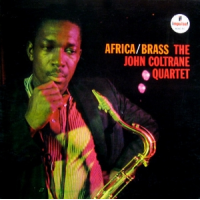 The John Coltrane Quartet
The John Coltrane Quartet Africa / Brass
1961
When I first heard this I was fifteen and it was the gateway drug to jazz for me. It opened up the channels, particularly "Africa," which takes up the whole first side of the vinyl. It is such an immaculately composed and arranged album. There hasn't really been anything like it before or since. Like I said earlier, I played the bass and this was the first time I heard Reggie Workman. I'll always be in debt to my friend Stewart for bringing it over. He's no longer with us, sadly. He was a brilliant poet and musician and he changed my life by playing it for me. I could have named any Coltrane record, of course, because there's really not a bad Coltrane one on the Impulse! catalogue. I've probably spent more time dealing with A Love Supreme and its various editions, but Africa / Brass is the album that is fundamental for me.
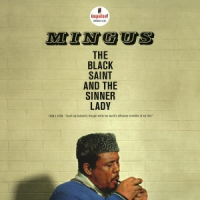 Mingus
Mingus The Black Saint And The Sinner Lady
1963
I'm really coming out of the closet as a mediocre bassist today. As with the Coltrane, choosing this was a little bit of a toss up. I love Mingus Mingus Mingus Mingus Mingus and I had to think for a few minutes about which to pick. Like Africa / Brass, The Black Saint And The Sinner Lady is another record that is incredibly well arranged and orchestrated and it opened my ears to Mingus as a great composer and visionary as well as bassist. I love everything about it.
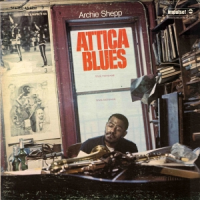 Archie Shepp
Archie Shepp Attica Blues
1972
I'm cheating on this one a little, because Archie Shepp thankfully is still alive. It's funny, I'm realising as we speak that these first three choices are all large group records, and of course there's lots of small group stuff on Impulse!. I chose it in part because of the message and the courage it took to address what was going on at the Attica prison. Also there's just so much music going on. I mean, there are vocals, Jerry Jemmott plays electric bass on one track, and it's all completely coherent and powerful. Every time I listen to it I find something new. Marion Brown plays brilliantly on it. And equally you have Jerry Jemmott and Cornell Dupree from King Curtis's band. So it's a great kind of synthesis of soul and R&B and political observation and jazz. It's a record I keep coming back to.
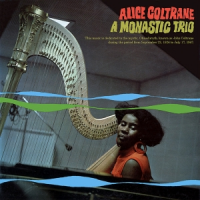 Alice Coltrane
Alice Coltrane A Monastic Trio
1968
While it's not obscure, this is definitely not the Alice Coltrane record that most people grab first. I just think it's so powerful. I think a lot about Pharoah Sanders and how it must have felt for him, to be chosen to play saxophone on what was really Alice's first tribute to John. Pharoah I think was a pretty confident guy though. And the great Jimmy Garrison is present too. It's an incredible sounding recording. What I also love is that Alice is equally mind blowing on the piano and the harp. It's going to sound like a funny comparison but I sometimes think about Alice like I think about Alex Van Halen and I wonder if she'd had a different name, which of course she did originally, she would be better known. I mean, Coltrane is a surname like no other and she was such an incredible musician. It feels so reductive when people just say "John Coltrane's wife Alice." She was a genius herself.
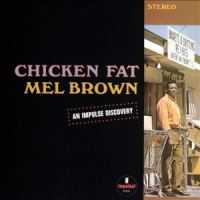 Mel Brown
Mel Brown Chicken Fat
1967
Bob Thiele produced this yet it's easy to say "Oh, it's just a great funky record." But Oliver Nelson did the arrangements and there's actually more in there if you give it a real listen. It's not a record people always bring up when they think about Impulse! but I love it. It's great pocket, great feel all the way through. Mel Brown should probably be better known than he is. He was a genius guitarist.
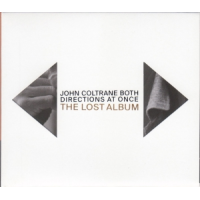 John Coltrane
John Coltrane Both Directions At Once: The Lost Album
2018
It's debatable whether this is a catalogue album, because we put it out recently, but working on it was such a powerful experience for me I have to include it. Like I said, we don't put out these lost recordings unless they stand on their own two feet. This one is such a rare occasion, because it really was an album, not simply a collection of alternate takes. Not that there's anything wrong with that. This is really one of the great mysteries: like why did it not come out? There have been theories and dissertations on that. To me it stands so strongly on its own and I love listening to it. Being part of the Both Directions At Once project and bringing it to the public, working with Ravi Coltrane, was something I treasure. But even if I hadn't got to work on it directly I would still rate it.
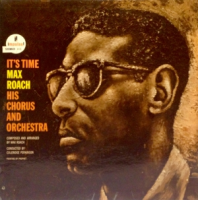 Max Roach
Max Roach It's Time
1962
When people think Max Roach was "just" a drummer they're missing so much of the story. The composing on this record is incredible. And Abbey Lincoln sings on it. I can listen to this anytime. Percussion Bitter Sweet is a great one too. One of the things about Impulse! is that it's not the biggest catalogue but there really aren't a lot of disappointing listens in it. I think maybe there's something to be said for its finite nature and maybe that's our motivation in not signing a million things today. We really want to be sure that something is going to hold up. After all, it's going to have that orange and black on the sleeve and that recognisable logo.
Tags
Interview
shabaka hutchings
Chris May
The Comet Is Coming
Sons of Kemet
Shabaka And The Ancestors
Creed Taylor
Bob Thiele
Ed Michel
Diana Krall
Brandee Younger
Ted Poor
Pino Palladino
Blake Mills
John Coltrane
Ornette Coleman
kamasi washington
Miles Davis
Ray Charles
Mel Brown
Alice Coltrane
Charlie Haden
archie shepp
Elvin Jones
Roy Haynes
Sonny Rollins
Pharoah Sanders
Reggie Workman
Marion Brown
Cornell Dupree
King Curtis
Jimmy Garrison
Oliver Nelson
Ravi Coltrane
Max Roach
Abbey Lincoln
Jerry Jemmott
Horace Silver
PREVIOUS / NEXT
Shabaka Hutchings Concerts
Support All About Jazz
 All About Jazz has been a pillar of jazz since 1995, championing it as an art form and, more importantly, supporting the musicians who make it. Our enduring commitment has made "AAJ" one of the most culturally important websites of its kind, read by hundreds of thousands of fans, musicians and industry figures every month.
All About Jazz has been a pillar of jazz since 1995, championing it as an art form and, more importantly, supporting the musicians who make it. Our enduring commitment has made "AAJ" one of the most culturally important websites of its kind, read by hundreds of thousands of fans, musicians and industry figures every month.






















